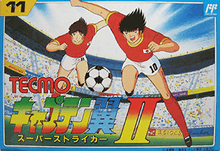Captain Tsubasa Vol. II: Super Striker
Captain Tsubasa Volume II: Super Striker (キャプテン
| Captain Tsubasa Vol. II: Super Striker | |
|---|---|
 | |
| Developer(s) | Tecmo |
| Publisher(s) | Tecmo |
| Composer(s) | Keiji Yamagishi Mayuko Okamura Mikio Saito |
| Series | Captain Tsubasa |
| Platform(s) | Family Computer |
| Release |
|
| Genre(s) | Sports, Role-playing |
| Mode(s) | Single-player |
Plot
Three years after winning the France World Cup for Japan, Tsubasa Oozora, moves to Brazil alongside his coach Roberto Hongo, in order to play with São Paulo F.C. Tsubasa intends to help São Paulo F.C. beat Flamengo and win the Brazilian National Tournament. At the first game of the tournament a Brazilian player named Carlos Santana watches Tsubasa as he plays. After Tsubasa wins the match, Carlos is astounded by his skill. Before the third match, Tsubasa encounters a goalkeeper named Claudio Meon, who challenges him to try score through him. Tsubasa attempts to score using his signature Drive Shot, but Meon managed to catch the ball. Tsubasa gets shocked that he caught the ball. In the third match Tsubasa again faces off against Meon, and after several shots caught by this goalkeeper Tsubasa starts to wonder if there is a way to score through Meon. He then figures it out, and develops a new Super Shot, dubbed the Drive Bicycle Kick, which works similarly to the Drive Shot, but is shot with a Bicycle Kick. He uses his new shot to score through Meon and it works. After Tsubasa beats Meon, Carlos is really amazed at Tsubasa's skills. An unknown character shows up to tell Carlos that Flamengo can still win the Brazilian National Tournament and that he has the potential to become a "Super Striker". Then the mysterious guy disappears. Carlos wonders who the mysterious figure was and what he meant by the term "Super Striker". After defeating the other Brazilian clubs in the Rio Cup, Tsubasa finally makes it to the finals against Carlos' Flamengo. Tsubasa wins the Rio Cup, and is then approached by Mr. Katagiri.
Part 2: High Schools Tournament
Gameplay
This term refers to the style of the gameplay. Rather than being a straightforward soccer sim. Many of the Captain Tsubasa games featured fully animated cut scenes throughout the match leaving the player to make key strategic decisions and then watch the outcome. There are different types of choices that the player may choose, most notably more choices than its predecessor. The player can choose to tackle, dribble, shoot, intercept, block or simply do nothing. Choices with the ball low is to do a volley shot, trap the ball or clear. With the ball high the player can choose to shoot with a header (or a bicycle kick only with selected players), trap the ball or clear. As the goalkeeper, same goes with the original game either to punch the ball or catch it. Some players also have a special moves, these special moves would normally require a lot of guts (energy) to be used compared to doing the normal move. For the player guts are very limited, while for the computer, they may use their special moves over and over again. When playing the storymode of the game, the player must win each match to progress, but when you lose, it the player must play the previous match, when losing or winning, your players can level up making a match easier for the player (maximum level is 100). When a match is won players would rank up more than they lose.
Music
The original score for the game was composed by Keiji Yamagishi, Mayuko Okamura and Mikio Saito (Metal Yuki.) Most of the songs played during the game's Cinema Displays were created by Mayuko Okamura. Mikio Saito composed the song for the Flamingo team (in this game the music changes according to the team in control of the ball.) All the other songs of the game, all of the sound effects, and the sound programming were created by Keiji Yamagishi.[1]
Trivia
Some of the music in this game have remixed versions of its predecessor. Such as:
- The Enemy theme from the Rio Cup is remixed from the enemy theme from the National Tournament in Captain Tsubasa (video game).
- The Enemy theme from the High Schools Tournament is remixed from the Enemy theme from the World Tournament in Captain Tsubasa (video game).
- The Hyuga's theme is remixed from his theme in Captain Tsubasa (video game)
- The Penalty Shootout theme is remixed from its theme in Captain Tsubasa (video game)
Glitches
In the English translation of this game. An unknown glitch in the 4th match occurs (in some cases). Such as if a player is about to use a Super Skill in before (or with) the Extra time. It will show a soccer ball just moving around with a black screen background.
Translations
Arabic translation
Circa 1994–1996, the game was unofficially translated and bootlegged into Arabic as "Captain Majed 2" (Arabic: الكابتن ماجد 2: المهاجم الهداف), based on the Arabic dub of the anime, since the show was extremely successful in the Arab world. translated by Extra Ordinary.[2]
English translation
In 2007, hayabusakun released a fan translation as an IPS patch for the Japanese ROM.
Turkish translation
In 2008, Cruyyford translated game into Turkish, since Captain Tsubasa was popular in Turkey.
Persian translation
In 2015, Farid finished translation of the game into Persian, since the anime was very popular in Iran.
References
- "A Conversation with Keiji Yamagishi". Brave Wave Productions. Retrieved 2019-12-12.
- Look at list of games, (Link: http://u168.ru/shares/Games/Dendy/Rom/ ), Choose: Captain Tsubasa Vol. II - Super Striker (Arabic) (Unl) [!].nes , Click here.